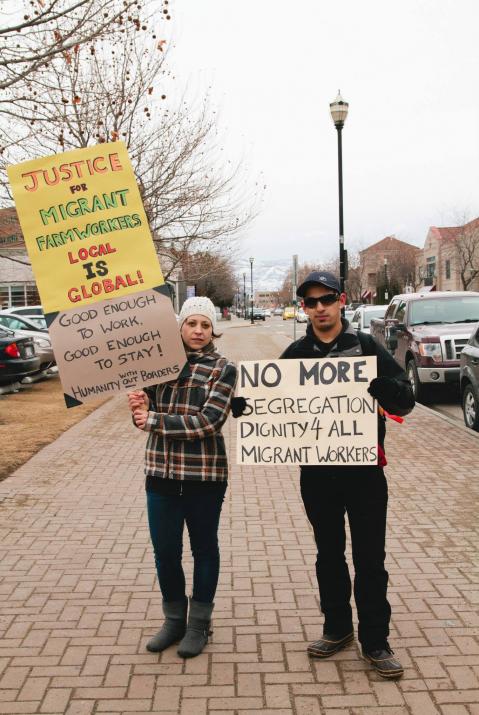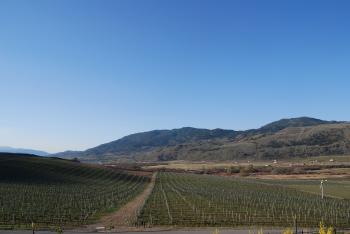British Columbia's Okanagan Valley is a breathtaking, 20,000 square kilometre strip of sagebrush-topped hills that slide into narrow lakes, where southwestern desert morphs into mountainous lake country in the space of an hour's drive. It is the hub of fruit growing and winemaking in B.C., industries that have been significantly (if at times invisibly) transformed by the North American Free Trade Agreement. It is also home, for eight months of the year, to 1,500 temporary migrant farmworkers.
Until the late 1980s, grape growers in B.C. grew hybrid grapes that were used to make cheap wine. A 1968 law required B.C. winemakers to buy 80 per cent of their grapes from vineyards in-province, but the Free Trade Agreement of 1987 and NAFTA threatened to remove those protections. In 1988 the hybrid varietals were removed and vitis vinifera vines were planted, leading to the eventual growth of an industry specializing in high quality wines. Whereas there were 17 wineries in the Okanagan in 1990, today there are 235, and the region is the second-largest producer of wine in the country behind Ontario's Niagara region.
Meanwhile, 4500 kilometres to the south, free trade had a significant impact on the Mexican economy. Imported agricultural products from Canada and the U.S. brought down the value of Mexican-grown crops, forcing 2.3 million farmers off the land. The price of all Mexican produce fell between 1997 and 2005, sometimes as much as 67 per cent. Farmers who could no longer make a living in Mexico sought opportunities elsewhere, some fleeing over the border into the States, others entering Canada through guest employment programs like the Seasonal Agricultural Worker's Program (SAWP).
While the SAWP has existed in Canada since 1966, it has only been open in B.C. since 2004. Now, an estimated 1,500 workers come to the Okanagan each year from Mexico and Jamaica. They work in fruit orchards and vineyards, tending to some of the vines that were planted 25 years ago as a result of trade protections removed by NAFTA.
Spectrum of voices on SAWP in B.C.
Blue Mountain winery in Okanagan Falls, B.C. was one operation that pulled out their vines in the 1980s in response to free trade. They replanted with European varietals and opened a winery in 1991. Owner Matt Mavety says that he started bringing in workers through the SAWP when it became too difficult to find local people who wanted to work the vines. Jaqcques LeCavalier, a vineyard owner in the nearby Similkameen, concurs, stating that hiring migrant farmer workers is now regular practice. "The workers coming from Mexico are experienced. They know the vineyards. They're reliable. It's difficult work and it's not easy to find a reliable source of workers locally."
Employers through the SAWP have to provide housing for their workers (in B.C. they are allowed to charge up to $580 a season in rent) and pay for their flights to and from Mexico. While some programs like the Live-In Caregiver program can ultimately lead to permanent residency, the SAWP does not, because workers cannot stay in the country for longer than 8 months at a time. Temporary farmworkers come in under a contract with a single employer and cannot change jobs without the written consent of that employer. While some workers do move from farm to farm throughout the season, their right to be in Canada is tied to a contract with a single employer.
I encountered a vast spectrum of opinions about the SAWP in the Okanagan depending on who I asked. Mavety said that there is "a lot of clarity and protection for the guys who come up here," that the contracts he enters are strict, and he told me that he didn't see any significant problems with the program.
Migrant farmworkers do work that no one else in the Okanagan wants to, and the SAWP gives workers a chance to earn money that they can send back to their families in Mexico and Jamaica. In the ten years since the program started in B.C., Okanagan farm owners have come to rely on the program, to the point that many farms now could not operate without migrant workers.
At the same time, though, activists who work with migrant farmworkers see major issues with the SAWP in general and migrant labour in the Okanagan in particular. Elise Hahn is the co-founder of Radical Action with Migrants in Agriculture (RAMA), an organization that seeks to "transform farm labour relations in the Valley." There is a long history of racialized labour in the Okanagan, of which the SAWP is only the most recent incarnation. RAMA has connected with 250 migrant farmworkers in the Northern Okanagan. They both offer services that the workers request, like English classes and transportation, but also plan events such as community barbecues where workers and local residents can commune in public spaces. This in itself doesn't sound like a radical act. But it is, given that most workers in the Valley lead lives that are geographically and linguistically isolated from the surrounding communities.
Levelling the playing field for migrant workers
Changing labour relations in the Okanagan is a long and somewhat abstract process. In the short term, Hahn believes that farmworkers' employment contracts need to be untied from their employers. "This change would increase workers' proclivity to report workplace abuse and allow workers to change employers, augmenting their autonomy and labour mobility," she argues. Secondly, workers should be "be entitled to status, or the right to regularize. At present, it is workers' temporary immigration status that maintains their precarity as they can be dismissed and deported for virtually any reason."

RAMA co-founder Amy Cohen with Alberto Lopez at a rally in Kelowna. Photo by Elise Hahn.
The fact that a migrant farmworker's presence in Canada is tied to their employer makes for a vastly different array of experiences, depending on the employer's take on housing and labour. Blue Mountain recently built new cabins for their workers; Mavety refers to his seasonal employees as "extended family." But there can be huge disparities in living and working conditions from farm to farm. One study found that workers on one farm enjoyed luxurious accommodations complete with Jacuzzi and lake views, while other workers on a cherry farm lived bunkhouses that slept 20 men to a cabin. Both forms of housing were technically acceptable under SAWP regulations.
Hahn believes that "there is a sense of workers' situations being in the hand of fate. If you get a conscientious employer, you can have a pretty decent experience in Canada. On the other hand, if your relationship with your employer is not good, then workers are at the mercy of that person's goodwill. Whether they decide to treat their workers well or not is essentially out of the hands of the workers."
It's a topic that makes people skittish and ultimately breeds a culture of silence. Hahn declined to put me in touch with the farmworkers she knows because she was concerned that speaking to media might threaten their job security. Sometimes there are victories, as when the B.C. Labour Board recently ruled in favour of migrant workers' right to unionize. But given that they lack the protections of regular Canadian citizens, workers are far less likely to voice their labour rights. Meanwhile, every farmer I called for this piece wanted to know what angle I was taking. SAWP migrant workers have been toiling within our national borders for 58 years. But nobody likes to talk about it.
What does 'local' really mean?
Temporary foreign worker programs in Canadian have been getting a lot of bad press of late, since revelations of abuses in the food services industry recently led to the suspension of new work in that sector. This is likely what made the farmers I spoke to so nervous. If the SAWP ended tomorrow, the 2014 growing season in the Okanagan would be doomed. But terminating the SAWP isn't the answer -- granting migrant farmworkers the same rights as the Canadians who labour alongside them is. Among the right to unionize, fair wages and adequate housing, migrant farmworkers should be given a path to Canadian citizenship if that is what they want.
In the end, revelations about conditions for migrant workers leave the consumer in a sticky spot. It's not enough to declare guest worker programs exploitative and call for their end (as evidenced from the interviews I conducted, conditions for migrant farmworkers run the gamut from ideal to horrible). What's required is a different kind of labour -- to think about the people who work so that we can have fresh food, people who are hidden from mainstream Canadian life and yet are always nearby. How local is a ripe Okanagan peach if it was picked by a worker from thousands of kilometres away, who doesn't have the right to stay in this country after the work is done?




Comments
Do
Don't